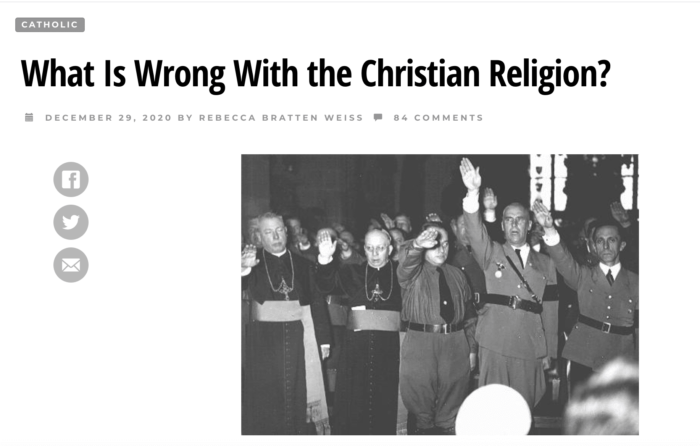"Ku Klux Kale" by Rod Dreber
Ku Klux Kale

The Christian Century is a magazine for the senescent liberal Protestant Mainline. When I heard earlier this month that it had published an article exposing the presence of white supremacists at farmer’s markets, I laughed it off as another example of the dingbat left policing the boundaries. It should not surprise anyone that unsavory people enjoy a delicious tomato as well as the next person. If a Communist or a neo-Nazi enjoys locally grown fruits and vegetables, I can congratulate him on his good taste in food while rejecting his politics. This is called being a grown-up. When this controversy arose in 2019 in Bloomington, Indiana, the adult mayor of that city resisted calls by progressives to kick allegedly white supremacist farmers out of the farmer’s market, saying that as long as the accused vendors were following the law, he was not going to play the role of thought police.
It turns out, though, that the article’s author, a vigilant progressive named Rebecca Bratten Weiss, identifies poor old Self as a gateway drug to the Ku Klux Kale:
Among traditionalist Catholics, one localist trend was labeled by writer Rod Dreher—himself a preeminent spokesman for polite Christian ethno-nationalism—as “crunchy conservatism.” The “crunchy cons” wed environmentalism and holistic living with traditional social mores, withdrawing from the influence of the globalized and secularized world. Piggybacking off this, Dreher proposed his “Benedict Option”—a suggestion that Christians should follow the example of St. Benedict of Nursia by distancing themselves from the evils of the world and living in intentional community with others of shared values.
“Polite Christian ethno-nationalism”? Golly. I wonder how the neurotic Bratten Weiss figures that. Then again, there doesn’t have to be logic for these people to make a vicious accusation like that. If they feel it — and they are always sniffing out wrongthinkers — it must be true. Do I even need to point out here that she clearly hasn’t read The Benedict Option?
Judging by her self-description on her website, Bratten Weiss has a rich inner life:
She has spoken at various academic and cultural events on topics ranging from Nietzsche’s aesthetics and Bronte’s feminism, to ecology in literature and vulgarity in religion.
Rebecca recently completed work on The Dirt, an eco-feminist novel exploring the impact of the fracking industry on a dysfunctional Ohio family.
She is also in the process of revising The Peacemakers, a speculative literary sci-fi in which women in a near-future matriarchy control men via advanced AI technology.
She is a member of the George Sandinistas, and one of the founders of the Muse Writers Collective.
Bratten Weiss looks cheerful, serene, and not at all likely given over to bitter binges on Sylvia Plath and Kate Bush:

I had never heard of this unhappy woman until a friend sent me her Christian Century essay last night. Apparently she is a Catholic who has a Patheos blog in which she writes things like this:

How surprising to learn that she used to be an adjunct teacher of English at Franciscan University of Steubenville. And she is some kind of ecumenist, as we learn from this 2019 essay. Excerpts:
Driving home with a load of hay, listening to Johnny Cash, wondering what I could burn as a sacrifice to Hecate, I start thinking that probably not many women on this road, driving truckloads of hay, and listening to Cash, are also contemplating witchcraft. Does this make me necessarily more interesting? Or is it automatically less interesting, because “being interesting” is a motive force for me? Not the only motive force, but maybe it taints everything it touches, so there’s a certain embarrassingly meta quality about all my love, or curiosity, or revenge.
Meta or not, the desire to burn something as a sacrificial offering is real. Thinking about burning is real. I have a truck full of a combustible material, and my truck is driven by combustion. I’m rumbling along on the cusp of a flame.
Bless her heart, I do not doubt it! More:
The internal combustion engine is insufficient for the goddess, however, and I have no intention of burning the hay. The questions about burnt offerings become pragmatic. Like, where to do it? If I start a fire in the back yard the kids will all come gathering around, asking if they can roast marshmallows. But I can’t just go wandering off into the neighbor’s field and start burning things (or can I?).
Then there’s the question of what to burn. Something I value, or something I hate? Which would Hecate prefer?
If I get the answers wrong, who knows, some solid citizen might call and have them send the firetrucks after me, and then it’s pretty awkward if I’d opted to burn, say, the testicles of some Nazi dudes who just happened to be scampering across my backyard at the right time. When I just happened to have my scythe handy. Oops. Now I have this whole conflagration of testicles to explain.
Even if it’s what Hecate wants, the fact is, when you’re castrating Nazis and burning their balls as an offering to ancient Greek goddesses, people tend not to be very understanding. They’re all “oh, the incivility!” Or “this is why Trump keeps winning.”
Now I’m worried that I went too far there, talking about castrating Nazis. Now I’m worried that I’m not interesting or edgy, but instead the kind of person from whom you instinctively back away.
You think? Hey, she said it, not I!
Anyway, as is often the case with censorious progressives, the witchy Bratten Weiss misses the irony of her condemning right-wing farmer’s market types for their exclusivity, in an essay in which she appears to claim that farmer’s markets should be zealously defended as a safe space for progressives and fellow travelers. Down with fascist eggplant! In fact, she hates localism itself, if localists are anything other than progressives:
From the perspective of Christian ethics, localism can be thought of as a way of living out both the mandates of charity and the responsibilities of stewardship.
A chance at political unity, a possible fix to the bleakness of rampant inequality, an emphasis on our moral responsibilities, both to the environment and to the worker—if localism sounds too good to be true, it may be because I have not yet addressed the ways in which it can go tragically wrong. On its own, it is not only insufficient, it can be dangerous. Too great an emphasis on the romance of the immediate can lead to fear of the other. Care for one’s own community can morph into isolationism. Localism can bleed into nationalism—and even White supremacy.
There was a time when I was unaware of this overlap. I rarely discussed politics with other growers; I assumed people who were invested in local food and sustainable agriculture must be liberal or progressive. I associated a familiar hippie farmers market aesthetic with ecological responsibility, multiculturalism, and peaceful coexistence.
Uh oh! People like Bratten Weiss ruin everything. When I wrote Crunchy Cons back in the mid-2000s, I was delighted to draw attention to people like the fundamentalist Christian family in north Texas who raised meat organically because they believed that was the best way to honor God’s Creation. There’s a quote in the book from the patriarch who says how surprised he was to discover that he had more in common with some hippie organic growers than he did with fellow Christian Republicans who lived a more conventional suburban life. Funny, but these folks weren’t threatened by the progressives who shared their love of organic, small-scale agriculture, and neither were the progressive small farmers threatened by them. They found common ground, and even solidarity. I guess Bratten Weiss, who is two tics away from a gran mal seizure, would want to cut the balls off the fundamentalist family’s sons and sacrifice them to a pagan goddess or something.
Bratten Weiss may be a Catholic, but she is definitely a Puritan. I was recently talking with a wealthy conservative white Catholic friend from the South who was explaining to me his discovery of the value of localism. He and his wife bought some land in the historically black part of their town, and are using it to help their black neighbors build community. They let black folks and others use the land for a farmer’s market, and for meetings between black community leaders and the local police, to build closer relationships (he showed me a photo on his smartphone of a recent gathering). He told me that even as relations between the black community and police in other parts of the country have grown worse, they have strengthened in his town, because it turns out that a lot of black people there don’t hate the police; they just want better policing. He talked about a woman black pastor in his town who makes this work of community-building possible. And he talked about long-term plans to restore what was once a thriving commercial sector of black-owned businesses.
My friend said that he has grown disillusioned with national politics, and now focuses on building up localism. This guy is very conservative. I’m guessing that his black woman pastor friend is … not. But they work together because they both want to make the town they share into a better place for them all to live. If Bratten Weiss showed up in their town, she would no doubt do her best to drive these two apart to purify the movement. People like that — and we have them on the Right too — are so exhausting. They are the kind of people from whom you instinctively back away. Unfortunately, they hold a lot of cultural and institutional power right now in America. Which is a big reason that we are in such a mess.

Comments
Post a Comment